Why we must improve aged care
More and more elderly people are living their last years in nursing homes. But with the increase in numbers comes the need to provide more staff and greater care for a population that is living longer and longer.
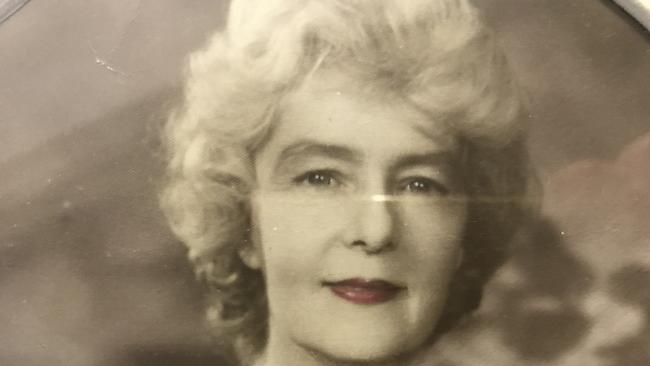
Local
Don't miss out on the headlines from Local. Followed categories will be added to My News.
It begins with a fall.
It happens, when it shouldn’t. It happens everywhere. Old people fall. It is the beginning of the end.
A broken collarbone.
A horrible bump to the head.
A bruise darker than midnight.
It starts a slip, as if sliding on ice, towards a crack in time where the darkness awaits. It turns a journey into a tragedy. Because it shouldn’t be this way.
That’s how I think of what is happening to her, one day at a time, getting closer to the edge and there’s nothing I can do to stop it. It’s coming.
Yesterday her face was grey. Ashen they say. A sign of the dying, the decaying of the body that has held her for 103 years. That’s a long time. I know. It’s done well.
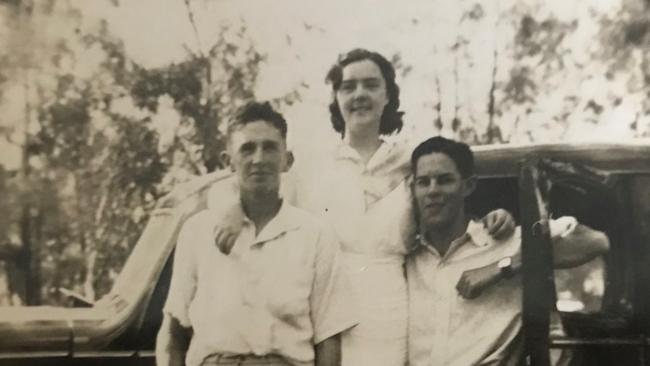
She was only ever a little thing, now she is less. She is her bones with just a thin, thin layer of skin. Even her eyes are slipping into her. She is so small I find myself thinking of a tiny butterfly caught in a wind that is carrying her away. I think of the dead bird decaying by the bottom of the tree. She looks caught between the two - between life and death.
When my grandmother fell, the most recent time, it was from her chair. Not the blue one, that is the one she sits by the door in and watches the staff and the residents go by; well she thinks she does because it’s been a while since she could see who was there.
It has actually been a while since she sat there, though for her it was yesterday.
‘I want to sit in my chair,’ she says when we tell her she can’t move anymore, can’t get out of the bed, because this fall, the last one - where she pressed the buzzer but nobody could come because there are too many people just like her and she didn’t get in first - has meant she can’t mobilise and can’t use her walker and can’t even go to the bathroom anymore.
‘But I sat in my chair yesterday. Where’s my blue chair?’ She is insistent. I like that about her.
She loses her place. This is true but she is 103 and there is a lot of time to consider. A very long line. So the blue chair, that’s just one of the things we talk about.
‘I went for a walk in the garden yesterday’, she says.
‘I go for a walk twice a day. I go out around the garden. And all over the place.’
She used to. That bit is true.
She used to.
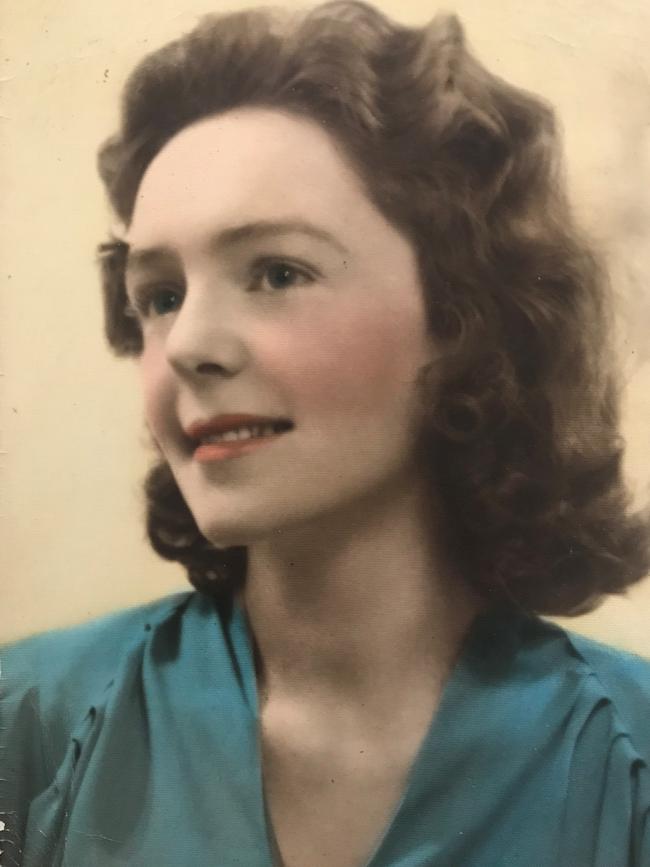
Don’t get me wrong. We are lucky. She is dying and she is loved. She is dying and the people who care for her, care for her. The staff kiss her on the forehead and call her darling. But she is dying, she is going where I can no longer find her. And it is then that I feel like I am two and the unfathomable idea of death is still as mysterious and difficult as it was then. But where is she going? Will she be okay?
For a while now when we arrive we have to whisper in her ear, ‘it’s me’. And then she says softly back, ‘hello darling’. Then soon, again, ‘who’s there and what time is it’.
I have read that time divides near the end, it slides around and it too risks slipping into the cracks in the ice. But with my Nan, for now, it’s not for long, just moments and then we are off again, skating through her past. Now she loves to talk about the rain, the heat, the weather.
‘Is it raining. I’m sure I can hear rain,’ she says.
But it’s not. Not right then. Maybe, where she is going it is.
Then I say ‘do you remember when you used to go swimming off the banks of the Macintyre River’ and she does. Or ‘when Bob (her husband) went to war and you had three young babies and they all got measles and mumps and chickenpox one after the other’. And I say how did you cope? And she says ‘I just did’. I say do you remember making jam rolly polly dessert with all that sugar and jam. Do you remember that? And what about pineapple upside down cake and carrot jelly. Who could forget that? Grated carrot in yellow jelly. Back then we loved it. Now that’s a summer salad.
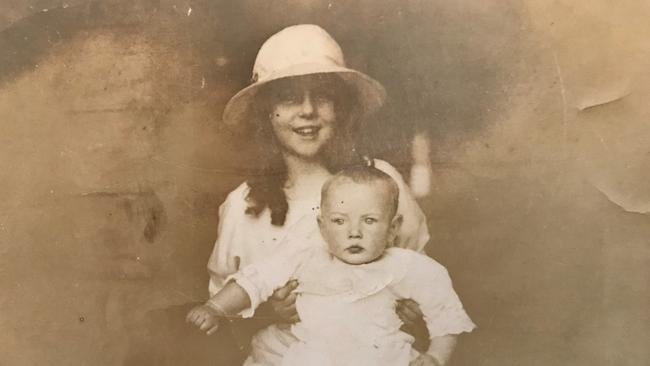
This and that. The kangaroo she nursed from a joey that ate butter on toast. The time she and her brothers waited in a forest with their horses while the hailstorm shredded the trees and sent ‘sheets of ice’ to the ground. There’s the buggy her father purchased when there was enough children to warrant one (that’s six: Alan, Norman, Eric, Edith, Leslie and Joan. Edith Miriam Chandler is my grandmother).
They drove the buggy six miles to school, in the sun, in the rain, under the stormy skies, where the rivers swelled and ebbed beneath the willows and the cod fish swam. Then there’s the time, on the sandy hills of the sheep station, where her Father worked, under the big old orange trees bursting with fruit my Nan ate so many she refused to eat another orange, not in her life. That’s a long time not eating oranges. She doesn’t eat chocolate either, although recently she’d taken to drinking Milo - before she stopped.
There’s just a few things she won’t do; eat oranges and chocolate and she won’t go in the sun either. Not even a ray, not a hint of that bright, burning light.
Sometimes I say would you like to go outside, feel the air, smell the garden, just for a little bit. And she says maybe next time. And just in case I have forgotten: ‘don’t take me in the sun though will you’.
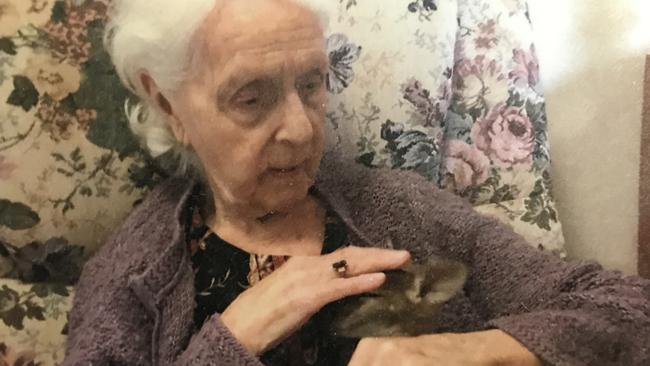
Her leaving makes me remember many things.
Odd things like the colour of the bowl we made rissoles in or the can opener for the beetroot tin and the mint under the back stairs of her old house.
There’s the sweet smell of her bathroom and its dusty pink tiles. The chill of the floor as we sat in the heat of summer and played cards on the floor or the warmth of the electric blanket in her big, cosy bed with the soft floral flannel sheets. How I would lie on my side staring at her glamorous dresser beside me, the draws filled with necklaces made with beads of every colour, her cupboard lined with ball gowns and hundreds of dresses.
I think of how sometimes she used to say when the ice cream van chimed in the street and we sat on her front steps, by the big old, big thorny rose bush that had flowers the colours of a pale peach, and she’d say maybe next time we’ll have ice cream and sometimes we did. Maybe it was 20c back then. I don’t remember. I do remember Elvis Presley, Dean Martin, Tom and Jerry and Jerry Lewis. I remember the Foxtrot, the Two Step and the Pride of Erin. We danced them together. Now she sings a song that goes ‘3’o’clock in the morning we danced the whole night through’. And sometimes she grins and says ‘and you know we did’. Not me. We were always in bed early, except when the tennis was on. No, that’s what she tells me about the balls, the dances she went to when she was young, a girl born in 1916.
A girl who loved to dance, who loved to play cards, who loved to sing and wear beautiful hats. Who always wore makeup and had her hair cut every six weeks. Who put curlers in her hair after she washed it and set it so at a glance she looked like Elizabeth, Queen Elizabeth that is. And she was glamorous.
She loved to watch the 6pm news. She loved doing other little things too like cutting her vegetables up in the morning and putting them in a tiny blue bowl filled with water ready for the evening meal. A cup of black tea in the afternoon and ‘don’t leave the bag in too long’. A salad sandwich with a slice of meat for lunch. A milk coffee for morning tea with a shortbread biscuit (sometimes a Monte Carlo) and muesli for breakfast.
It’s funny last week I walked past the muesli in the cereal aisle at the supermarket and I remembered again that she is leaving. And I tell myself it’s just cereal the same way when I open the lid on a certain brand of fabric softener and I can smell her sheets, her towels but I remind myself, it’s just laundry liquid after all.
It’s been a while since I took my grandmother shopping. We used to go every Friday for years. Maybe ten years. We used to go to town every Thursday. We drank coffee and ate carrot cake and my children sipped ice chocolates with whipped cream and we talked about her growing up on a sheep station or the brown snake that chased her brother on his horse. We know all the stories. My children know them too. Nan ate toasted cheese with ham and tomato and had one cappuccino. And we always went to the Shingle Inn.
But the stories are coming to an end. She’s not awake a lot now. It’s been four weeks since we had to put pain patches on her and she’s been more tired now. It’s been five weeks since she stopped eating much at all. At first we measured her meals in teaspoons. Sometimes there were two teaspoons, that’s all. Six for the whole day. Two weeks ago she managed ten at lunch. That was a good lunch. And we talked for two hours. I know it was two hours because time is important. Nan is measuring the time. I am not sure if it is passing too slowly or quickly for her now. It’s hard to know. She’s of a generation who won’t talk about the end, won’t say if there’s anything else she needs. ‘I’m not bad for an old lady,’ she says. And it’s true. Not bad at all for a beautiful lady.
* Edith Miriam Chandler passed away February 19


